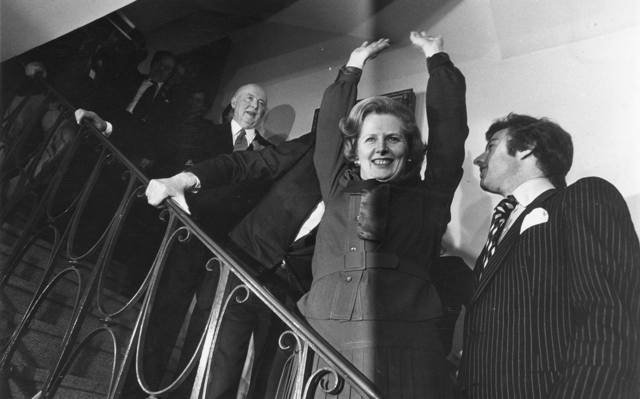Groundbreaking British Prime Minister Margaret Thatcher Dies At 87
April 8, 2013, 9:33 a.m.
Thatcher led Britain for 11 years.

Thatcher, after her 1979 victory
Margaret Thatcher, who led Great Britain as prime minister from 1979 through 1990, died today of a stroke at age 87. She was the first female Prime Minister in Great Britain's history. The NY Times' obituary notes she was "the 'Iron Lady' of British politics who pulled her country back from 35 years of socialism, led it to victory in the Falklands war and helped guide the United States and the Soviet Union through the cold war’s difficult last years."
The Washington Post's obit reads, "Infuriated by Britain’s image as the 'sick old man of Europe,' she set out to dismantle Britain’s cradle-to-grave welfare state, selling off scores of massive state-owned industries, crushing the power of organized labor and cutting government spending with the purpose of liberating the nation from what she called a 'culture of dependency.'" And from the BBC obituary:
Her legacy had a profound effect upon the policies of her successors, both Conservative and Labour, while her radical and sometimes confrontational approach defined her 11-year period at No 10.
Her term in office saw thousands of ordinary voters gaining a stake in society, buying their council houses and eagerly snapping up shares in the newly privatised industries such as British Gas and BT.
But her rejection of consensus politics made her a divisive figure and opposition to her policies and her style of government led eventually to rebellion inside her party and unrest on the streets.
Thatcher also opposed the unification of Europe as well as supported apartheid in South Africa (she called Nelson Mandela a "terrorist").
Ed Millibrand, the current leader of the Labour party in Great Britain, said, "She will be remembered as a unique figure. She reshaped the politics of a whole generation. She was Britain's first woman prime minister. She moved the centre ground of British politics and was a huge figure on the world stage. The Labour party disagreed with much of what she did and she will always remain a controversial figure. But we can disagree and also greatly respect her political achievements and her personal strength."